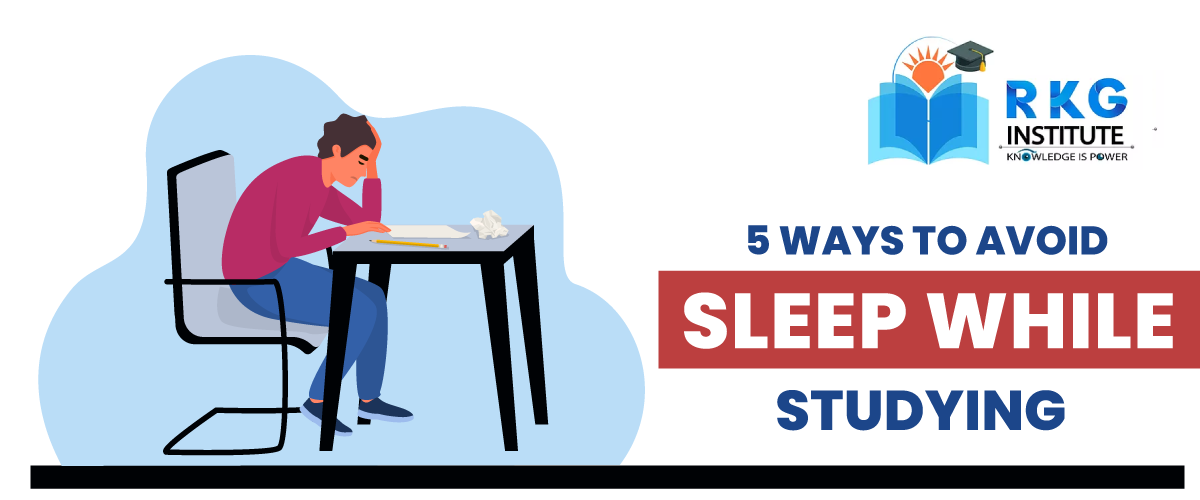One of the major and the most common challenge that students face while studying is sleepiness. Students very frequently complain of laziness and sleepiness while they try to focus and study, and they eventually end up procrastinating their study plan. Even if they continue studying somehow, their productivity falls. This could be due to many reasons such as lack of adequate sleep at night, low energy levels in body, etc.

This not only affects the notion of effective studying, but also poses a great challenge to the disciplined life of a student. The student ends up feeling guilty for not studying.
This article highlights 5 ways to avoid sleep while studying, to ensure that your study time remains highly effective and productive.

- Follow a Healthy Lifestyle
One of the major reasons for sleepiness while studying is the degrading energy and health of your body. Many students nowadays neglect healthy lifestyle, the repercussions of which gradually amass to produce such symptoms.
- Always take adequate sleep. Every student must sleep at least for 7 hours per day. Taking less sleep due to work, study, internet scrolling or any other reason will directly affect your sleep cycle and make you less productive. This is a direct and instant reason for you feeling sleepy while studying.
- Prefer healthy food and remain hydrated. Eat fresh fruits for energy and focus more than coffee and tea. Coffee is an instant energy solution which cannot last very long. Fruits on the other hand, release energy at a slow pace over a long period of time. It is equally important to remain hydrated throughout the day.
- Avoid eating junk. Junk food drains energy out of your body and makes you lazy. The more you consume it, the weaker you become.
Following this kind of lifestyle is very important for students if they want to have energetic and productive days throughout their life.

- 2. Always have a Separate Study Space
One of the major mistakes which aggravates this problem of sleepiness is that students generally prefer to study on their bed or sofa or the like.
You need to understand that the environment you are surrounded by has immense impact of the productivity of your work. If you study comfortably lying in your bed, it will become a lot easier to sleep than to study! Your environment will encourage you to sleep, and you will easily fall in the trap.
It is therefore, advised that you always study on your desk and chair, or in the absence of it, make a separate space in your room dedicated solely for studying. This will make sleeping a bit difficult and will motivate you to study.

- 3. Take a Nap!
Seems sarcastic? Well, it is. One of the best ways to avoid sleep during study is to take a nap right then and there, on your table for a maximum of 15 minutes. Set an alarm of 15 minutes, put your head down on your table itself, and sleep. Taking a short nap keeps you fresh and actually increases your productivity many-fold.
However, this exercise must be done with CAUTION.
- Always set a timer of 15 minutes before you sleep. Your time must not exceed this limit.
- Do not sleep comfortably. Do not sleep on your bed or sofa or something which makes you comfortable. Sleep on your table, or simply by resting yourself on your chair.

- 4. Focus on writing more
One tactic that you can use when you feel sleepy is to write more than read or listen. While reading or listening, zoning out becomes way easier and you don’t even get to know the moment you zone out.
This is difficult with writing. Writing requires all your attention and focus. The moment you lose your focus you will stop writing and will become aware of zoning out. Then you can recollect your focus and start studying again.
Another useful tip is to read aloud while studying. This will also have the same implications as of writing.

- 5. Take occasional breaks
Sitting with the intention of studying continuously for a long period of time is one thing which can aggravate and motivate your sleepiness. If you sit for 25-30 mins at a time followed by a 5-minute break, your brain will be motivated to complete such slots rather than get discouraged.
Therefore, it is advised that you sit with the intention of taking frequent breaks while studying, so that you get motivated to finish your small slots rather than postponing it.
We hope these 5 tips will be beneficial to all the students who were seeking the solution to this common problem. Stay tuned with RKG Institute for more such content.


